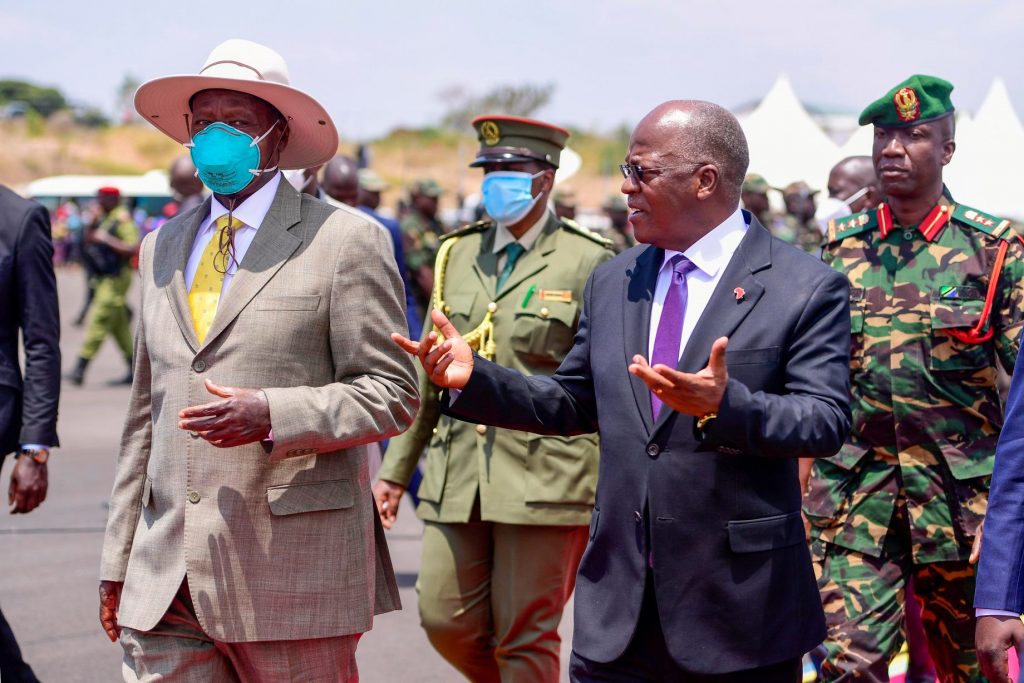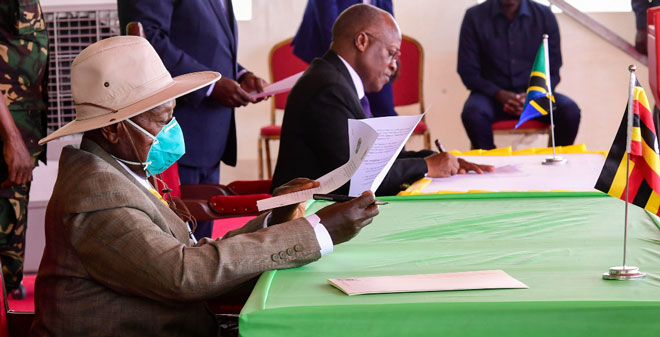
Uganda’s President Yoweri Kaguta Museveni and his counterpart John Pombe Magufuli of Tanzania, have September 13, 2020, signed the implementation agreement for the East African Crude Oil Pipeline (EACOP) at Chato, Tanzania.
Presidents Magufuli and Museveni met today in Chato, Tanzania, where they signed the Host Government Agreement (HGA) for the construction of the Crude Oil Pipeline project, which will enable Uganda to transport her crude oil onto the international market.

The 1,445KM Pipeline will transport crude oil from Uganda’s oil fields in the Albertine Graben to the Port of Tanga on the Indian Ocean.
The move came a day after the Ugandan government signed a Host Agreement for the EACOP with France oil giant Total EP, which is one of the biggest stakeholders in Uganda’s oil sector.
The Host Agreement, signed between Total Chief Executive Officer (CEO) , Patrick Pouyanne and the Minister for Energy Hon. Goretti Kitutu on behalf of the Ugandan government, will enable Uganda transport her crude oil from the Albertine Graben to the refinery in Tanzania. It was signed during a function that was held at State House, Entebbe and was presided over by President Yoweri Kaguta Museveni.
According to the Petroleum Authority of Uganda (PAU), East Africa’s development as a preferential business hub and the region’s remarkable investment flows are largely attributed to the capital investment in the oil, gas and manufacturing industries with the respective governments undertaking several multibillion dollar projects, such as, The East African Crude Oil Pipeline Project (EACOP).
The EACOP will transport crude oil from Uganda to the Indian Ocean Coast in Tanzania. The construction of the pipeline will lead to a substantial rise in Foreign Direct Investment (FDI) for both countries.
The 3.5 Billion USD investment capital associated with the construction and operation of the Pipeline will be directly injected into the economies of Uganda, and Tanzania increasing their Foreign Direct Investment (FDI) by over 60 % during the construction phase.
The project will be constructed and operated through a pipeline company with shareholding from the Uganda National Oil Company (UNOC), the Tanzanian Petroleum Development Corporation (TPDC), and the three oil companies, CNOOC, TOTAL and TULLOW.
Unlocking Potential For Oil Exploration In Region
The East African Crude Oil Pipeline will unlock East Africa’s oil potential by attracting investors and companies to explore the potential in the region.
Enhancement of The Central Trade Corridor
The project will contribute towards the enhancement of the central corridor between Uganda and Tanzania through the development of new infrastructure, logistics, technology transfer and the improvement of the livelihoods of East Africans.
Employment Creation
The pipeline will also create short term (2-3 years) employment for both highly skilled and, semi-skilled professionals, and casual laborers. It is expected that casual workers who will be involved in the construction phase of the project will be sourced locally from each country, thereby promoting the development of local capacity to develop other pipeline projects in the region.
Business Opportunities
The pipeline will also provide business opportunities for the different sectors of the economy involved in the pipeline design, construction, and operation and decommissioning of the project, and create a trickle down economic effect spurring the development of local content in the oil and gas sector as a whole.
Developing the Oil & Gas Value Chain
The development and maintenance of the pipeline infrastructure in the two countries will also contribute to the capacity building and know-how of national service providers.
Targeted national content programs will aim at enhancing the transfer of knowledge, training and capacity building to enable these companies to be pre-qualified and potentially bid for complex and high caliber projects.
Increasing Infrastructure Development
Along the pipeline route, service roads will be upgraded or developed to facilitate the access to and maintenance of the pipeline during its construction, operations and decommissioning phases. These roads will increase accessibility of the areas traversed by the pipeline enhancing the movement of goods and people and overall economic exchanges. This also comes along with other infrastructural development like water, electricity, accommodation, among others.






